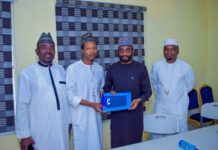Nigeria’s AI Scaling Hub and the Path to Tech Sovereignty
By Fatimah Yusuf Usman,
On June 5, 2025, the Federal Government unveiled a groundbreaking $7.5 million agreement with the Bill & Melinda Gates Foundation to establish the National Artificial Intelligence (AI) Scaling Hub. This is more than just another government announcement.
It is a declaration of intent, a commitment to step into the arena of global innovation not as a spectator, but as a participant with ambition and direction. The hub, supported both technically and financially by the Gates Foundation, reflects more than mere philanthropy. It is a sign of trust.
It suggests that Nigeria is increasingly being seen not just as a market for global tech but as a potential source of solutions. That this partnership was sealed during a high-level visit by Bill Gates himself adds symbolic and strategic weight. The AI Scaling Hub will prioritise three critical sectors—healthcare, agriculture, and education.
These are not abstract development themes. They are the daily struggles and aspirations of millions of Nigerians. And if deployed effectively, AI can provide real answers. Imagine systems that predict disease outbreaks before they spread, or that help farmers in rural areas maximise yield and reduce waste.
Picture personalised digital tools that adapt to children’s learning speeds, giving every student, no matter their location, a fair chance at education. This is not science fiction. It is what the future could look like. It also speaks to the boldness of the Federal Ministry of Communications, Innovation and Digital Economy, led by Dr. Bosun Tijani.
Since taking office, the Minister has signalled a shift toward a data-driven, forward-looking approach to public service. The AI Scaling Hub stands as another chapter in that unfolding vision. But like all visions, it will rise or fall on how well it is executed. The dream is promising, but execution is everything.
To move from vision to impact, we must focus on four essentials. First, regulatory foresight. AI demands a framework that balances innovation with ethics, privacy, and accountability. Second, inclusive development. The benefits of this technology must reach beyond city centres and corporate offices.
They must speak the languages, address the realities, and honour the dignity of everyday Nigerians. Third, institutional cooperation is essential. Ministries, agencies, universities, and the private sector must operate not in silos, but in concert. Fourth, and most vital, is talent.
We must build an army of thinkers, coders, and creators who are trained, supported, and empowered to lead. Without the human capital to drive the AI engine, even the most expensive tools will gather dust. For too long, Africa’s engagement with technology has been reactive.
We wait for tools to arrive from elsewhere, only to find that they do not fit. With the right investment, this initiative could be Nigeria’s way of rewriting that pattern. We can become not just consumers of global tech, but contributors to its values and architecture. The AI Scaling Hub is not just a national milestone.
It can be a continental model. If governed with integrity and sustained with seriousness, Nigeria can rise as a thought leader in AI across Africa—exporting solutions, not just importing tools. History may one day look back at this moment and ask what we did with the opportunity we were given.
Whether we used it as another ribbon-cutting ceremony or as the start of something transformative. The answer will depend on the leadership we show, the partnerships we foster, and the commitment we bring. Artificial Intelligence will shape the future.
The question is whether Nigeria will help shape Artificial Intelligence. With the right steps, the AI Scaling Hub can become more than a project. It can become a symbol—of transformation, of ambition, and of a country that finally chose to lead.
Fatimah Yusuf Usman writes from PRNigeria Centre, Abuja. She can be reached via: [email protected].















